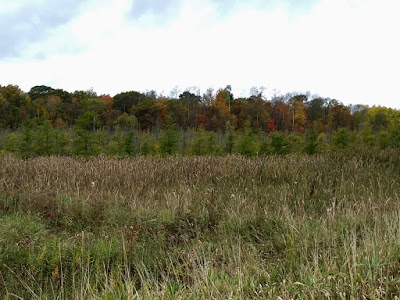 |
| hints of color change in tamarack
Photo by J. Harrington
|
So to does our built environment, according to Strong Towns. Although we're not entirely sure we agree with each of the points being made, they offer some interesting thoughts on how we Americans, or at least many of us, approach investment in infrastructure.
To begin with, some common ground: American infrastructure is not being maintained. This is a critical threat to our future prosperity, one that grows more dire each day. The sooner we begin to address this problem, the less painful the subsequent actions will be. On this concept, Strong Towns and the ASCE are on the same page. Where we dramatically depart is both our evaluation of the cause of this crisis as well as our recommendation for what must be done.As we begin to consider the value of ecosystem services such as clean air and clean water, will we need to consider tradeoffs between traditional infrastructure, green infrastructure, restoration of already polluted lands and waters from historic activities such as mining operations? Will each of these sectors be treated as investments that have to show a return? How will we measure ROI from each type of investment? Are these even the right questions for how we treat our built and natural environments? Must everything be filtered through economics and financial screens? Have we no higher and better values against which to measure the benefits of our activities?
Have you taken a look at the United Nations' Sustainable Development Goals? Have you ever considered the possibility that a sustainable development framework might offer common grounds on which communications between "environmentalists" [Goal 6: Clean water and sanitation] and "miners" [Goal 8: Decent work and economic growth] could be improved? The goals aren't structured as either or. We need all of them for a sustainable future. Think about Houston, south Florida and the Keys, Puerto Rico and the Virgin Islands, California wine country and... who's next? We don't yet have a way to reach Planet B. Maybe we better figure out how to agree on how to take care of what we have. For ideas on that, consider reading (or watching) Rancher, Farmer, Fisherman to see some examples of how jobs AND environment can be grown together. We need more of that kind of investment.
Vespers
In your extended absence, you permit me use of earth, anticipating some return on investment. I must report failure in my assignment, principally regarding the tomato plants. I think I should not be encouraged to grow tomatoes. Or, if I am, you should withhold the heavy rains, the cold nights that come so often here, while other regions get twelve weeks of summer. All this belongs to you: on the other hand, I planted the seeds, I watched the first shoots like wings tearing the soil, and it was my heart broken by the blight, the black spot so quickly multiplying in the rows. I doubt you have a heart, in our understanding of that term. You who do not discriminate between the dead and the living, who are, in consequence, immune to foreshadowing, you may not know how much terror we bear, the spotted leaf, the red leaves of the maple falling even in August, in early darkness: I am responsible for these vines.
********************************************
Thanks for visiting. Come again when you can.
Please be kind to each other while you can.
No comments:
Post a Comment